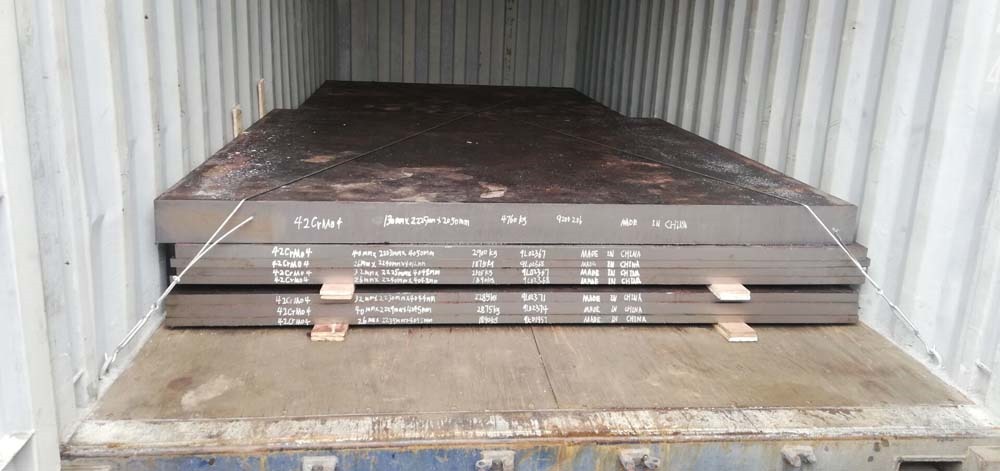Mo40 Steel Plate
The Mo40 steel plate, known as AISI 4140 in the American standard and as EN 19 or DIN 1.7225 in the British standard, is a type of low-alloy heat-treatable steel. This steel plate is produced with a combination of chromium, molybdenum, carbon, and manganese elements, and due to its high tensile strength, excellent impact and wear resistance, and versatility in heat treatment processes, it has wide applications across various industries.
Below is a comprehensive review of the physical and mechanical properties, chemical composition, standards, applications, and important considerations when purchasing Mo40 steel plates.

Chemical Composition of Mo40 (AISI 4140) Steel Plate
| Element | Approximate Percentage |
|---|---|
| Carbon (C) | 0.38 – 0.43 |
| Chromium (Cr) | 0.80 – 1.10 |
| Molybdenum (Mo) | 0.15 – 0.25 |
| Manganese (Mn) | 0.75 – 1.00 |
| Silicon (Si) | 0.15 – 0.30 |
| Phosphorus (P) | Maximum 0.035 |
| Sulfur (S) | Maximum 0.040 |
| Iron (Fe) | Remainder |
Mechanical Properties of Mo40 Steel Plate
| Property | Value |
|---|---|
| Tensile Strength | Approximately 655 MPa |
| Yield Strength | Approximately 415 MPa |
| Brinell Hardness | 197 HB |
| HRC Hardness | Approximately 13 |
| Modulus of Elasticity | 190–210 GPa |
| Elongation at Break | 25.7% |
Physical Properties of Mo40 Steel Plate
Density: 7.85 g/cm³
Melting Point: 1416°C
Machinability: Good (about 65%)
Heat Treatment of Mo40 Steel Plate
Mo40 steel plate can undergo various heat treatments such as induction and flame hardening, normalizing, stress relieving, forging, annealing, and nitriding. These processes improve mechanical properties including hardness, fatigue resistance, and service life.
Difference Between Mo40 and AISI 4130
Both belong to the alloy steel category, but the main difference lies in carbon content. AISI 4140 (Mo40) has higher carbon content, leading to better wear resistance and high-temperature strength, whereas 4130 offers better weldability.
Applications of Mo40 Steel Plate
Due to its high strength and heat resistance, Mo40 alloy steel plate is used in:
Manufacturing shafts, crankshafts, piston rods
Gears, couplings, hydraulic components
Heavy industrial equipment and construction machinery
Mold making, ejectors, cams, and mold bases
Manufacturing bolts and screws resistant to high pressure
Equivalent Standards for Mo40 Steel Plate
AISI 4140 (USA)
DIN 1.7225 / 42CrMo4 (Germany)
BS 970 708M40 / EN19 (UK)
Important Considerations When Purchasing Mo40 Steel Plate
When buying Mo40 steel plate, consider the following:
Verify chemical analysis according to standards
Type of heat treatment applied (tempering, annealing, nitriding)
Required thickness and dimensions
Final hardness of the product
Type of rolling (hot rolled or cold rolled)
In the Iranian market, Mo40 alloy steel plates (1.7225) are offered by reputable domestic and international manufacturers. Among domestic producers, Isfahan Steel Company, Alborz Iranian Steel (Faico), and Oxin Steel Khuzestan are well-known brands producing high-quality plates. Oxin Steel Khuzestan is especially recognized for producing thick plates with desirable mechanical properties, attracting industries such as oil, gas, petrochemical, and heavy equipment manufacturing. Alongside domestic production, international brands also hold a significant market share, including TISCO (China), POSCO (South Korea), U.S. Steel (USA), ThyssenKrupp (Germany), and Voestalpine (Austria), offering plates with global standards and specific technical features.
SSAB STEEL SAZEH Company, with a wide domestic supply network and direct imports from reputable global brands, ensures that critical national infrastructure projects use Mo40 steel plates with guaranteed quality. This company provides customers with the best options in terms of quality, price, and delivery time, and is recognized as one of the leading suppliers of industrial steel plates.